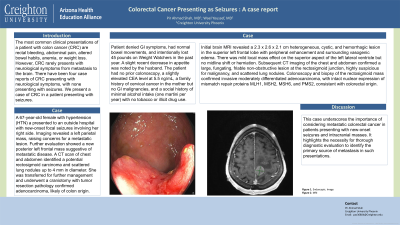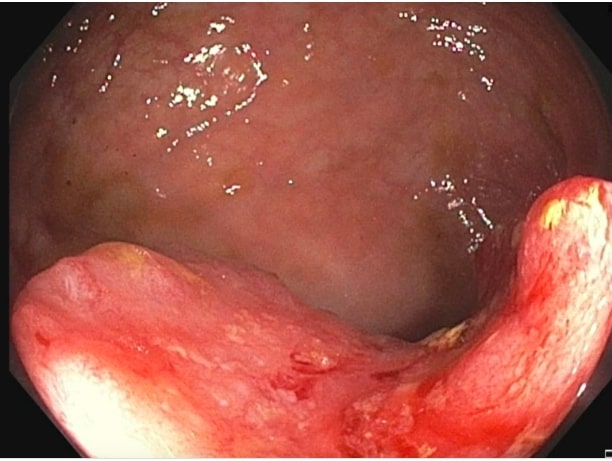Monday Poster Session
Category: Colon
P2003 - Colorectal Cancer Presenting as Seizures
Monday, October 28, 2024
10:30 AM - 4:00 PM ET
Location: Exhibit Hall E

Has Audio
- PS
Pir Shah, MD
Creighton University
Phoenix, AZ
Presenting Author(s)
Pir Shah, MD, Wael youssef, MD
Creighton University, Phoenix, AZ
Introduction: The most common clinical presentations of a patient with colon cancer (CRC) are rectal bleeding, abdominal pain, altered bowel habits, anemia, or weight loss. However, CRC rarely presents with neurological symptoms from metastasis to the brain. There have been four case reports of CRC presenting with neurological symptoms, with none presenting with seizures. We present a case of CRC in a patient presenting with seizures.
Case Description/Methods: A 67-year-old female with hypertension (HTN) a presented to an outside hospital with new-onset focal seizures involving her right side. Imaging revealed a left parietal mass, raising concerns for a metastatic lesion. Further evaluation shwed a new posterior left frontal mass suggestive of metastatic disease. A CT scan of chest and abdomen identified a potential rectosigmoid carcinoma and scattered lung nodules up to 4 mm in diameter. She was transferred for further management and underwent a craniotomy with tumor resection pathology confirmed adenocarcinoma, likely of colon origin.
Patient denied GI symptoms, had normal bowel movements, and intentionally lost 45 pounds on Weight Watchers in the past year. A slight recent decrease in appetite was noted by the husband. The patient had no prior colonoscopy, a slightly elevated CEA level at 5.5 ng/mL, a family history of cervical cancer in the mother but no GI malignancies, and a social history of minimal alcohol intake (one martini per year) with no tobacco or illicit drug use.
Initial brain MRI revealed a 2.3 x 2.6 x 2.1 cm heterogeneous, cystic, and hemorrhagic lesion in the superior left frontal lobe with peripheral enhancement and surrounding vasogenic edema. There was mild local mass effect on the superior aspect of the left lateral ventricle but no midline shift or herniation. Subsequent CT imaging of the chest and abdomen confirmed a large, fungating, friable non-obstructive lesion at the rectosigmoid junction, highly suspicious for malignancy, and scattered lung nodules. Colonoscopy and biopsy of the rectosigmoid mass confirmed invasive moderately differentiated adenocarcinoma, with intact nuclear expression of mismatch repair proteins MLH1, MSH2, MSH6, and PMS2, consistent with colorectal origin.
Discussion: This case underscores the importance of considering metastatic colorectal cancer in patients presenting with new-onset seizures and intracranial masses. It highlights the necessity for thorough diagnostic evaluation to identify the primary source of metastasis in such presentations.

Disclosures:
Pir Shah, MD, Wael youssef, MD. P2003 - Colorectal Cancer Presenting as Seizures, ACG 2024 Annual Scientific Meeting Abstracts. Philadelphia, PA: American College of Gastroenterology.
Creighton University, Phoenix, AZ
Introduction: The most common clinical presentations of a patient with colon cancer (CRC) are rectal bleeding, abdominal pain, altered bowel habits, anemia, or weight loss. However, CRC rarely presents with neurological symptoms from metastasis to the brain. There have been four case reports of CRC presenting with neurological symptoms, with none presenting with seizures. We present a case of CRC in a patient presenting with seizures.
Case Description/Methods: A 67-year-old female with hypertension (HTN) a presented to an outside hospital with new-onset focal seizures involving her right side. Imaging revealed a left parietal mass, raising concerns for a metastatic lesion. Further evaluation shwed a new posterior left frontal mass suggestive of metastatic disease. A CT scan of chest and abdomen identified a potential rectosigmoid carcinoma and scattered lung nodules up to 4 mm in diameter. She was transferred for further management and underwent a craniotomy with tumor resection pathology confirmed adenocarcinoma, likely of colon origin.
Patient denied GI symptoms, had normal bowel movements, and intentionally lost 45 pounds on Weight Watchers in the past year. A slight recent decrease in appetite was noted by the husband. The patient had no prior colonoscopy, a slightly elevated CEA level at 5.5 ng/mL, a family history of cervical cancer in the mother but no GI malignancies, and a social history of minimal alcohol intake (one martini per year) with no tobacco or illicit drug use.
Initial brain MRI revealed a 2.3 x 2.6 x 2.1 cm heterogeneous, cystic, and hemorrhagic lesion in the superior left frontal lobe with peripheral enhancement and surrounding vasogenic edema. There was mild local mass effect on the superior aspect of the left lateral ventricle but no midline shift or herniation. Subsequent CT imaging of the chest and abdomen confirmed a large, fungating, friable non-obstructive lesion at the rectosigmoid junction, highly suspicious for malignancy, and scattered lung nodules. Colonoscopy and biopsy of the rectosigmoid mass confirmed invasive moderately differentiated adenocarcinoma, with intact nuclear expression of mismatch repair proteins MLH1, MSH2, MSH6, and PMS2, consistent with colorectal origin.
Discussion: This case underscores the importance of considering metastatic colorectal cancer in patients presenting with new-onset seizures and intracranial masses. It highlights the necessity for thorough diagnostic evaluation to identify the primary source of metastasis in such presentations.

Figure: Endoscopic view of colonic mass
Disclosures:
Pir Shah indicated no relevant financial relationships.
Wael youssef indicated no relevant financial relationships.
Pir Shah, MD, Wael youssef, MD. P2003 - Colorectal Cancer Presenting as Seizures, ACG 2024 Annual Scientific Meeting Abstracts. Philadelphia, PA: American College of Gastroenterology.
